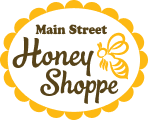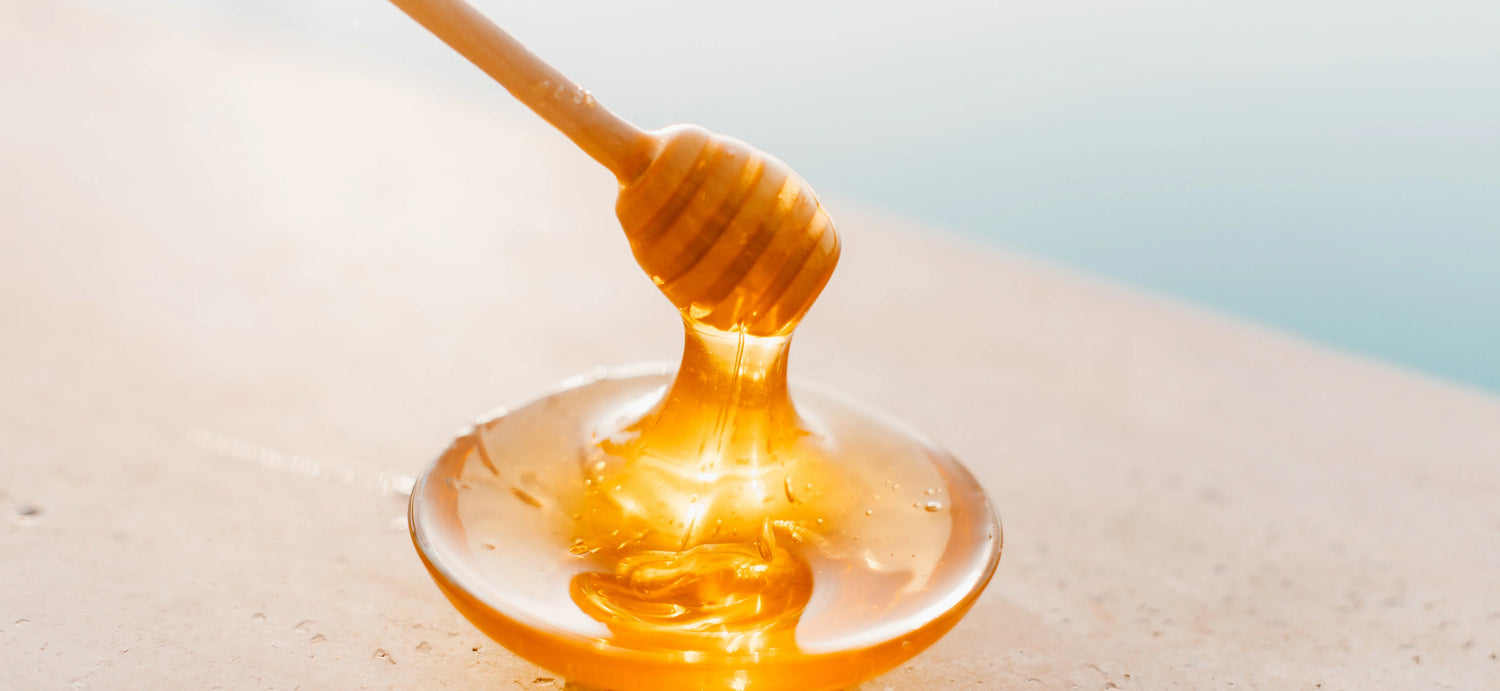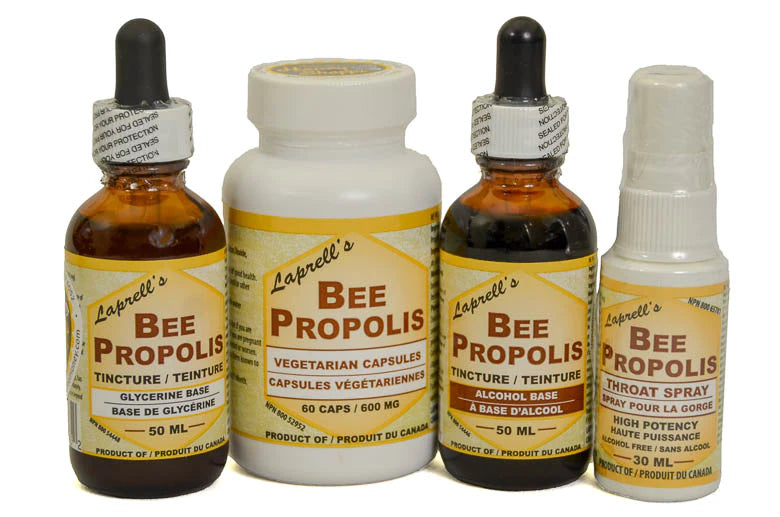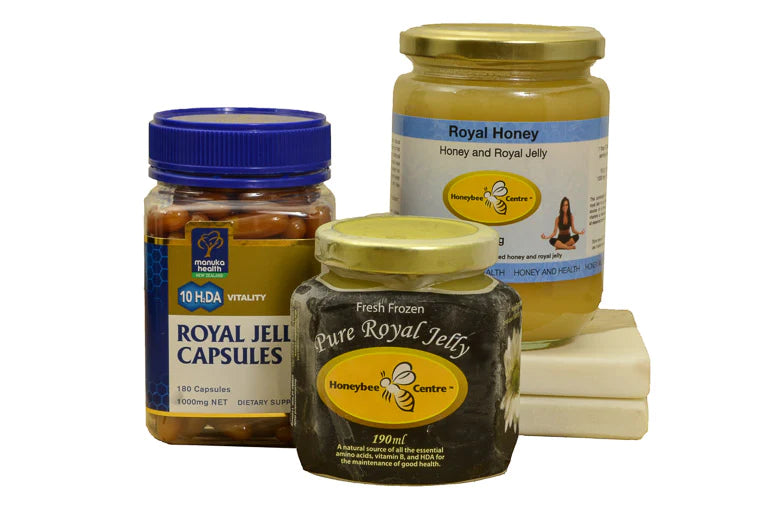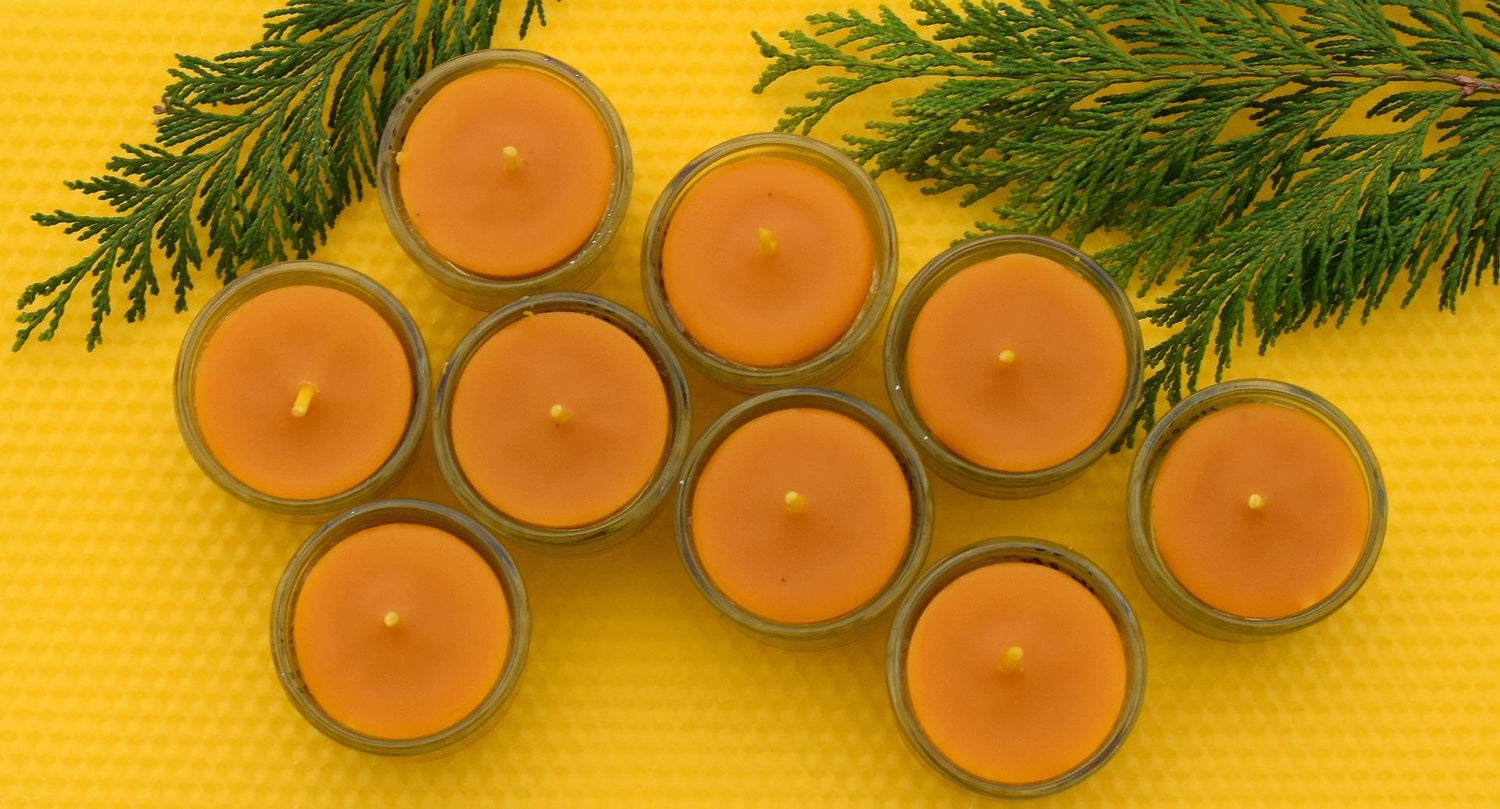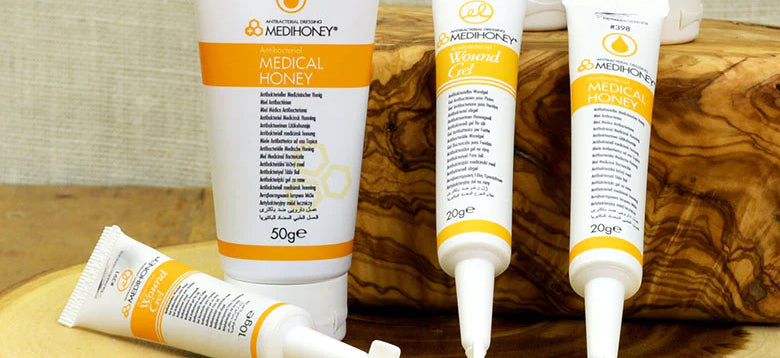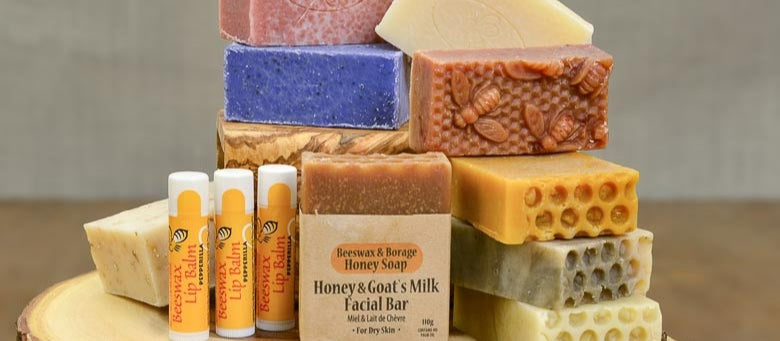-
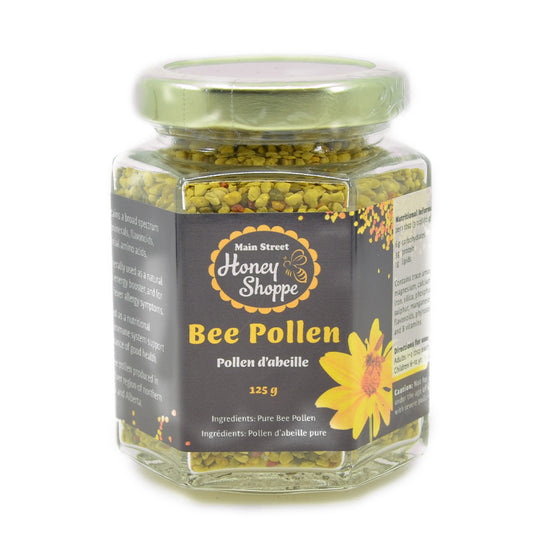
Bee Pollen
Regular price From $14.99 CADRegular priceUnit price per -
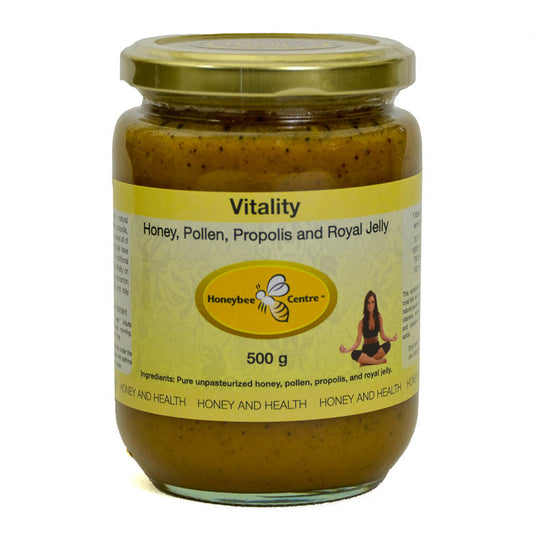
Vitality - Honey Infused with Bee Pollen, Propolis, and Royal Jelly
Regular price $27.99 CADRegular priceUnit price per -
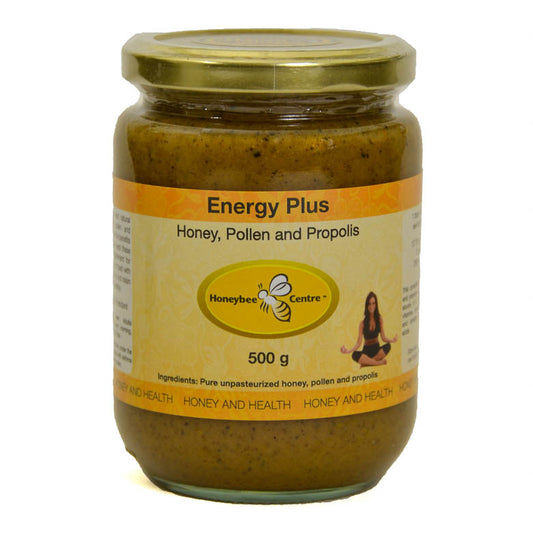
Energy Plus - Honey Infused with Bee Pollen and Propolis
Regular price $19.99 CADRegular priceUnit price per
What is Bee Pollen
Honeybees collect grains of pollen from a variety of plants that they specifically select for their high nutrient value. Pollen is the primary source of nutrients for honeybees providing the protein, fat, vitamins, and trace minerals (such as calcium, magnesium, iron, and zinc) they require. Bee pollen is used primarily as a food supplement for both people and animals. It is incredibly nutrient dense with a complete and balanced spectrum of amino acids (building blocks of proteins), every vitamin known (especially rich in B2 and B3), all of the trace elements essential for mammals, healthy fatty acids, and a vast array of phyto-compounds including carotenoids, phenolics, flavonoids, and phytosterols.
Uses of Bee Pollen
Bee pollen contains nearly all the nutrients required by humans. It is used mainly as a dietary supplement acting as a natural multivitamin and protein source which is highly bioavailable. It is also used to help relieve hay fever allergy symptoms and modern research has shown it has significant anti-inflammatory and anti-oxidant properties.
Types of Bee Pollen
Bee pollen contains pollen granules from a wide variety of plants and varies by region and season. Fresh pollen is perishable and must either be frozen or air dried to preserve its nutrient value and prevent it from spoiling.
-
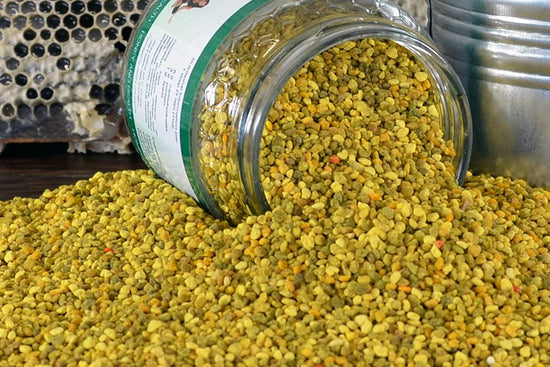
Air Dried Pollen
- The majority of pollen available is air dried as it is the easiest to store for long periods of time.
- Air dried pollen is available in granules or milled into a powder which may be made into capsules.
- Our Bee Pollen is 100% Canadian and is produced in the Peace River area of northern British Columbia and Alberta.
-
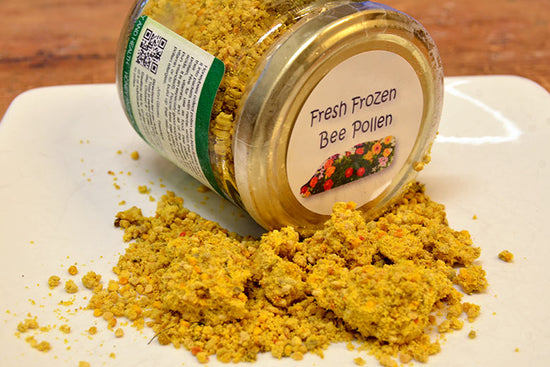
Fresh Frozen Pollen
- Fresh frozen pollen, as it name infers, is collected and immediately frozen to retain all of its nutrient value and is considered “raw”. It is softer and sweeter than air dried pollen but must be kept frozen.
- NOTE: Limited availability
- Our Fresh Frozen Pollen is 100% Canadian and is produced in the Peace River area and lower Fraser Valley of British Columbia.
-
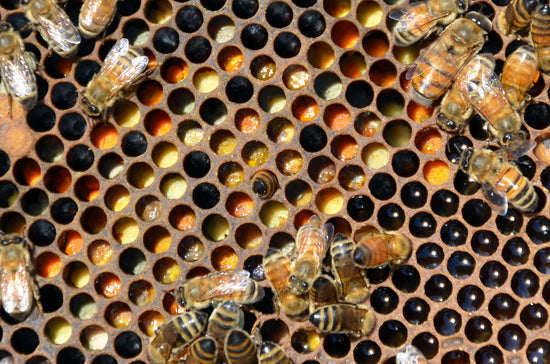
Bee Bread
- Since bees don’t have a freezer in their hive, they have evolved a system of fermentation, which both makes the phyto-compounds in pollen more bio-available to them, and allows the pollen to be stored in the hive at hive temperature (approx 35 C) for well over a year! Pollen in this form is known as “bee bread”.
- NOTE: Limited availability
- Our Bee Bread is 100% Canadian and is produced in British Columbia.
Nutritional Composition
The composition of pollen varies greatly depending upon the botanical source.
| Main Components | Content Min-max (g/100g dry weight) |
|---|---|
| Proteins | 10 – 40 |
| Lipids | 1 – 13 |
| Carbohydrates | 13 – 55 |
| Dietary fibre, Pectin | 0.3 – 20 |
Protein – contains a complete and balanced spectrum of amino acids
Vitamins – contains trace amounts of all known vitamins and is especially rich in: nicotinic acid (vitamin B3), pantothenic acid (vitamin B5), and riboflavin (vitamin B2)
Minerals – Contains all of the essential trace elements for mammals. However, a normal daily recommended dosage of pollen does not contain the recommended daily serving of these trace elements for humans.
Lipids – Pollen is a healthy source of dietary fats. The dominant fatty acids found in pollen are: alpha-linolenic acid (an omega-3 polyunsaturated fatty acid), linoleic acid (an omega-6 polyunsaturated fatty acid), oleic acid (monounsaturated), and palmitic acid (saturated).
Phyto Compounds – these provide the most important nutritional aspect of pollen. Although the specific phyto-compound profiles vary depending on the source plants and biome, pollen is rich in carotenoids, phenolics, and their sub-category flavonoids and phytosterols.
Active Enzymes – Fresh, unheated pollen contains numerous active enzymes, coenzymes, and hormones. Antioxidant enzymes (ex. catalase) help fight or prevent damage caused by free radicals.
Health Benefits
The medicinal properties of pollen are largely attributed to the hundreds of phyto-compounds that are present in pollen. The benefits of these compounds are far ranging as shown by the following examples:
| Phyo-Compounds | Beneficial Properties (Ref) |
|---|---|
| Lycopene (a carotenoid) and phytosterols | Can reduce prostate inflammation and are associated with lower risk of prostate cancer |
| Hundreds of carotenoids and phenolics | Strong antioxidant activity protects against a range of health conditions, from heart disease to cancer to cognitive impairments |
| Flavonoids including herbacetin, isorhamnetin, kaempferol, luteolin, myricetin, quercetin, rutin, and tricetin. | Epidemiological studies indicate that the higher the flavonoid intake, the lower the risk for cardiovascular disease. |
| Flavonoids | Lower cholesterol, reduce inflammation, and are antibacterial, anticarcinogenic, and antiviral. |
| Rutin (a flavonoid especially concentrated in bee pollen) | Improves the condition and function of capillaries. This helps control diabetic retinopathy, hemorrhoids, hypertension, varicose veins, and venous insufficiency. |
| Lutein and zeaxanthin (carotenoids) | Helps prevent cataracts and macular degeneration. |
| Nutrients and phytosterols | Improve fertility and reproductive success in animals. |
Physical Performance and Fitness
Pollen has long been used by athletes as a completely natural way to improve athletic performance.
Relief of Hay Fever Allergy Symptoms
The phyto-compound content of bee pollen supports overall immune health. This is the primary mechanism for relief of hay fever symptoms. The large number of antiallergenic, anti-inflammatory, and immunomodulating compounds in pollen are largely responsible for its allergy symptom relief.
What Our Customers Say
-
Sareeta
Vancouver BCI’ve been enjoying Vitality for four years! Since the pollen is local, it makes the seasonal allergies so much more bearable. I’ve had seasonal allergies since I was child, and we tried everything. So grateful for this!
